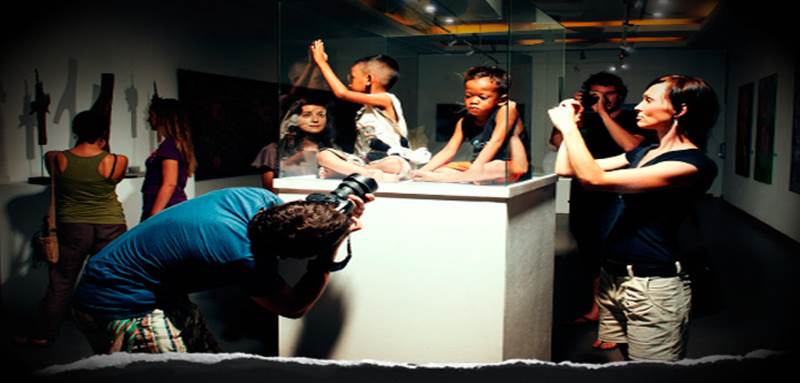 What does the cobbler have to do with culture?
What does the cobbler have to do with culture?
Did you ever hear the expression “The cobbler’s children have no shoes”? It refers to the phenomenon when people who are skilled at something don’t demonstrate that same skill in their own lives.
This statement could apply to how we teach students about culture in education abroad. Educators are so busy talking culture at conferences, conducting academic research about it, and talking cultural shop at the water cooler, yet the topic is usually diminished to a few mere minutes in a pre-departure orientation and then often explained away by the very general, ubiquitous iceberg model and U curve. Abstract for those who have never truly immersed in another culture and often at the tail end of a pre-departure orientation (or a few pages in a document that no one reads), many students find the cultural mini-crash course hard to relate to and typically return their concern to the logistics of what to pack to ensure a fashionable stay abroad. (I cannot tell you how often I was asked at pre-departure orientations for advice about plugs and adapters for hair curlers in the 90s and then hair straighteners in the 2000’s – a sign of the times.)
I also witnessed the cobbler anomaly when I worked in the global relocation industry. The companies that work in this arena sell cross-cultural training services (as a cornerstone product) to Fortune 500 company executives who are relocating abroad, yet they typically fail to provide it to their own employees who are first point of contact counselors to expats and repats from dozens of countries. Similar to educators who aim to create “global citizens” and “21st century employees,” this industry also fails to deliver what they sell and know well, in house.
The paradox: how we limit our student sojourners
The Chronicle article, Study Abroad Could Be So Much Better, drives the point home. The lack of effective, intentional cultural competency training (or discussion!) is limiting the experience for students who are purchasing an experience and spending thousands of dollars to engage IN another culture abroad. Often feeling unsure of how to effectively and appropriately interpret and communicate across cultures, students will retreat back to the safety bubble of their faculty leader and compatriots.
A recent conversation with two colleagues who research global service learning prompted me to again think about how we, as educators, treat culture as secondary to the personal/professional gain of a volunteer or study abroad experience. Despite all our collective wisdom in the field of international education, we still tend to treat culture as a second class citizen. Somehow, we think we can unbundle culture from the experience of traveling across regions, borders and oceans because we are engaged in the act of (perceived) “helping” or “studying.”
Simply put, WE CAN’T.
Like the busy cobbler, we serve our field well and then forget to apply our ability to educate about intercultural competence inside our own four university walls. Higher ed is either too busy, poor or political to mandate faculty training on culture and how to explain/debrief it and critical incidents abroad. (Let us not forget the diverse cultures in the classroom. One does not have to lead a course abroad to still need to be interculturally competent.) Instead, we jump on the bandwagon to increase the “numbers” of people that we send abroad, knowing logically that if they are not adequately prepared to engage in a different cultural setting, more harm can be done than good. (More going abroad is of course a wonderful goal – I’m not trying to bash IIE or their initiative. With that said, when more go and naively harm, the lofty goal backfires over the long run. If this initiative had been ‘more go with more cultural preparation’, I’d be fully on board.)
Harm can feel like a harsh word, yet is evidenced by the growing, for profit voluntourism industry – a 2 BILLION dollar sector that occasionally has been known to participate in deceitful practices like orphanage tours.

Well intended, potentially harmful outcomes
Before I continue, let’s pause to think about culture for a moment. Culture may be defined as:
“the way of life of a people, the sum of their learned behavior patterns, attitudes
and material things.”
(Source: https://www.ishk.net/hall.pdf)
Imagine walking into a cafe anywhere in the world. If you dropped in from outer space, you wouldn’t know what coffee was, how to pay for it (or that you’d have to) or how to stand in line – or even what a line is. You certainly wouldn’t understand the more important components of these experiences and interactions – the WHY : history and values that have created these patterns. At best, you’d be coached by someone regarding how to proceed.
But in a more significant, real world cross-cultural experience, not knowing how to engage can be much more disasterous than missing out on some java! We can offend host families, create (or confirm) stereotypes about our home country when doing things like taking selfies in historical sites, and miss opportunities to engage with others on a deeper level.
The worst case scenario: we can truly HARM others – economically, emotionally
and on a larger scale – in diplomacy.
You can’t unstick the unstickable
I act as a resume coach for the field of international education – and I am always stunned at how many people participate in education abroad and list their sojourn on their resume, but have no words to adequately explain what they learned about culture along the way. Their findings seem to be reduced to “it was different” or “fun” or “I didn’t have any problems in the new culture” (perhaps because they were so comfortably in their home country bubble that it was “like being at home!”)
Culture is part of the education abroad package. It is glued to the experience abroad – one can’t unstick it because of lack of time or ignorance about how to approach it.
You cannot unbundle culture from the experience abroad,
no matter how hard you try.
From airport signs in new languages, words with different meanings (talk to a Brit about your fanny and you’ll see what I mean!), to greetings, to non-verbals, to expressions of gratitude, to how and what is eaten, to when people marry and have children, to how people interpret weight (meat on your bones often translates to wealth in many parts of the world), to what you wear, to how you speak (or don’t speak the local language)… culture is everything and everywhere.
Why are we in this situation?
Why do we keep sending students out there and making excuses for why there isn’t enough time, money, information, collaboration, etc. to adequately guide soujourners through the maze of culture?
Here are 4 key reasons:
1) Ignorance (meaning uninformed): Some people are simply not aware of the necessity of understanding and explaining culture.
2) Money: Let’s face it. Colleges are businesses. Like any other bottom line business decisions, the bean counters will often put what isn’t absolutely “necessary” first. The problem here is that it IS absolutely necessary, but they either fall in category one above or are just lacking a moral compass. (My theory is that if we cancelled every pizza party on campus, we’d have a lot more funds to put toward cultural programming. I probably infuriated every campus cafeteria vendor in the country with that statement. Sorry Sodexho!)
3) Politics: We all know that administrators can’t mandate that faculty (and others on campus leading groups abroad) be trained in intercultural competency. (This is especially frustrating when some faculty treat administrators in education abroad like travel agents, or worse: bureaucrats!)
4) Time: Perhaps I should say “lack of .” With the increasing demands on faculty and administrators, one could almost buy this argument. However, if you have time to go to conferences, sight visits and lengthy committee meetings, you can probably carve some time into your schedule for a decent template for an intercultural professional development program for yourself and your campus. We have training tools at www.melibeeglobal.com for you to peruse on culture. You can also visit Better Abroad for more free resources around culture.
Just say no
I hope that education abroad administrators will reflect on this topic – and feel empowered to stand up and say ENOUGH IS ENOUGH. Culture matters. It is about time that we started saying to the powers that be, “No, I’m not supporting a course led by someone who has no knowledge of the host country’s culture and language, but a ‘passion’ for travel in their discipline. It isn’t ethical of me to do so. It doesn’t serve the students or the host communities in a way that changes our world for the better and can actually harm participants and locals.”
Yup, I said it. I hope you will too.
 About the Author: Missy Gluckmann is the founder of Melibee Global and Better Abroad. As you can see, she is a woman with an opinion! You can learn more about her here.
About the Author: Missy Gluckmann is the founder of Melibee Global and Better Abroad. As you can see, she is a woman with an opinion! You can learn more about her here.
